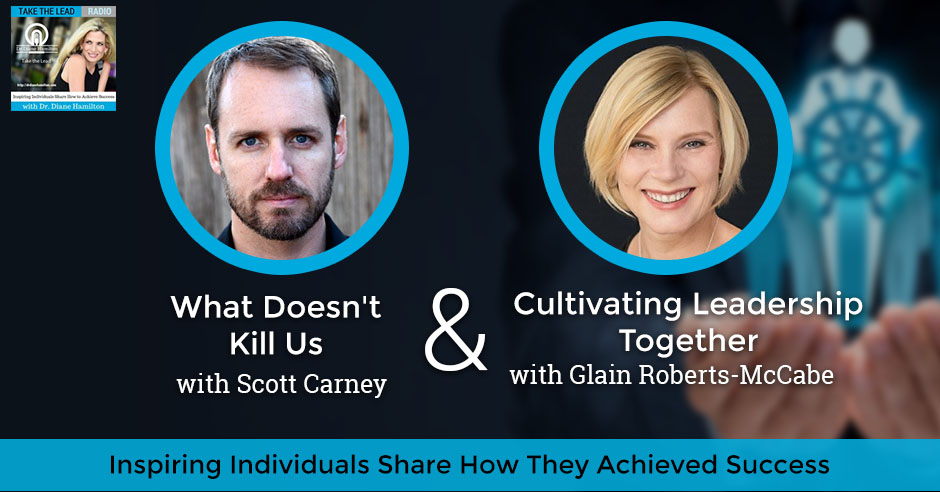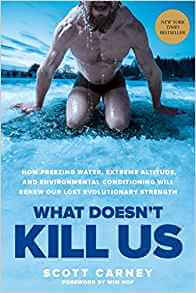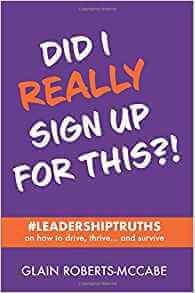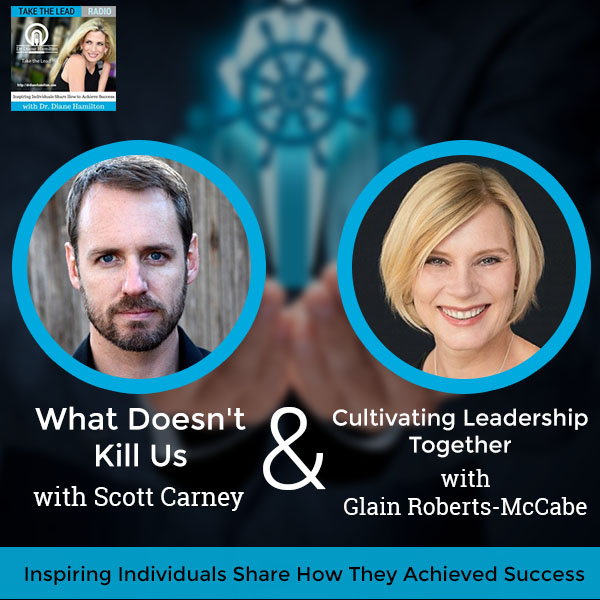
We have Scott Carney and Glain Roberts-McCabe. Scott is a CEO, investigative journalist, anthropologist, and a New York Times bestselling author. He’s got some interesting information about some of the things we can control with our minds. Glain is an author. She’s got a new book out. She’s a leadership specialist, executive and team coach. She’s the Founder of The Roundtable. You’ve probably seen her everywhere. She’s on many shows, podcasts and interviews.
Listen to the podcast here
What Doesn’t Kill Us with Scott Carney
I am here with Scott Carney, an investigative journalist and anthropologist who’s worked in some of the most dangerous and unlikely corners of the world. His work blends narrative, nonfiction, and ethnography. He currently is the Senior Fellow at the Schuster Institute for Investigative Journalism and a 2016-2017 Scripps Fellow at the Center For Environmental Journalism in Boulder. He has written What Doesn’t Kill Us, which is his most recent book. He’s also a New York Times bestseller of other works including The Red Market and A Death On Diamond Mountain. He was a contributing editor at Wired for five years. He has some new work he does at a company called Foxtopus. He calls himself the Chief Executive Octopus, CEO. Most people know him as being this successful New York Times bestselling writer. Scott, welcome.
Thanks for having me on.
I had Tolly Burkan on my show, the one who did the firewalking training for a lot of the people out there, including Tony Robbins and others. I’d like to talk about the control we have outside of our normal, what we think we can control realm. That’s a lot of what you deal with. Can you give me a little background? How did you get to this level of success? What led to your interest in journalism and anthropology?
I have always been interested in having adventurous, fun life, going out and doing things not necessarily for the money. At the end of my life I want to have a lot of great stories to tell. That’s been my passion since I was probably five years old. After college, I went in to do a PhD in Anthropology and I dropped out at the dissertation because I realized anthropology is not a great way to travel or to have adventures. It’s more a great way to sit and write a book that five people read inside the ivory tower. I still love those questions that anthropology asks, which were what is it about our cultures and our environments that make us human? I ended up making the switch over into journalism and I moved to India. I speak Hindi. I lived in India for about six years. At the beginning of my career, I was fascinated that every time I took a turn, there was this front-page breaking story happening. I broke major stories about organ trafficking. I was covering war zones. I was covering organized crime for Wired, Playboy, NPR. I was having a blast doing it. I loved being at that razor’s edge where consequences suddenly occur. By seeing things break apart, I also got this great view of how the world works.

What Doesn’t Kill Us: Anthropology is not a great way to travel. It’s more a great way to sit and write a book that five people read inside the ivory tower.
I’m writing a book on curiosity and you were talking about how you wanted these stories to tell and you liked to live on the edge. You at the age of five continued to be curious, where a lot of us stop being as curious. Was there someone in your family that promoted that? Did you come naturally? Did you have siblings who act like this, they want to go out and learn it all? Are you unique?
I had a great upbringing. I was always playing out in the woods. My parents were supportive of me. I had a great education. I entered into the world with one of the best hands you could be dealt. I also used every advantage that I had to continue following my passion. There are lots of the credit to my parents, my upbringing and all of that to get to where I am now.
I’m curious what your parents’ think of this interest you have that you write about and what you speak about in your lectures on TED? What you write about in your book is the ability to hack our bodies and use the environment to stimulate our inner biology. How did you become interested in that specifically? Can you tell that story of how you heard about Wim Hof and what led to that?
I had written a book, the main point of it was that extreme meditation and pursuit of spiritual perfection can drive you mad and even kill you. That’s where I started on this. I saw this guy on the internet, this picture of this more or less naked dude sitting in his underwear on an iceberg somewhere in north of the Arctic Circle. He was making these claims that he could teach anybody to have these almost super human powers to resist the environment. He also threw in some what sounded like total bogus stuff about controlling your immune system with the power of your mind. This was back in 2011. His name is Wim Hof. I wanted to get out there and debunk him as a charlatan before he got too famous because I know those messages are tantalizing.
I’ve written about this before, it’s within my wheelhouse. I flew out to Poland where he was running this training center. Wim Hof is Dutch, but cheap real estate was available in Poland for him. I meet him, I get off the plane and he’s this ruddy looking, short guy with sunburn and a big bulbous nose from probably years of alcoholism. I was like, “This is going to be the easiest job I ever had.” He even smelled bad. He looks like a homeless guy. I was totally not impressed by him. He drove me to his training center; this is the middle of the winter. I’d been living in India and Los Angeles at that time, I’m used to hot weather.
We get there and I get to this dilapidated training center. The first thing I see is this dude outside on the snow bank planes, throwing ice on himself. He’s naked more or less, he’s got underwear on. He’s throwing this ice on himself and there’s this steam coming off of his body. I’m like, “What in the hell is going on here?” I was spending a week with him. I decided that Wim Hof, there’s weird stuff going around. Wim Hof believed what he was saying. I could tell in him that there wasn’t this artifice that I’d seen in a lot of other people, he passionately lived. I decided to give his training a chance.
[bctt tweet=”We have this initial reaction to things where we don’t allow ourselves to expand into other areas that are potentially beneficial. ” via=”no”]Over the course of seven days, I ended up meditating on these icy banks of a river and melting the snow around me with my body heat. I climbed up this mountain in Poland in a pair of shorts and some hiking boots. It was two degrees Fahrenheit at the time. I was eight hours in the mountain. I was hot the whole way up. I was like, “This works.” I went going from somebody who was going to debunk this charlatan Wim Hof to a guy who guy was like, “I guess I have to go the other direction.” I spent off and on the next three quarters of a decade following his method and learning why it works. What was the magic of his training program, which is basically a breathing protocol and exposure to the cold? What was it that made this special? Were these super powers some prana and mana from heaven coming in, making you a magic unicorn? Are there evolutionary principles behind it that we can access?
What I found as a pretty science-based guy, there are evolutionary reasons why exposing yourself to variation in your environment bring out the human body ability to adapt. That adaption gives us resilience, gives us strength, and ability to exist in lots of different places. At the heart of it, if you think about where most of us live our whole lives. It’s 72 degrees Fahrenheit, perfect, air conditioned in the summer and heated in the winter narrow band of comfort. What Wim is saying is stretch outside of that comfort zone. Move your temperature and other things too into places that challenge you. By doing that you get strong and not only strong, but you get to do things that look impossible.
It brought to mind Leonardo DiCaprio in the water freezing to death. Did Leo have to die? Could he have used mind over matter to increase his temperature? Is there a limit to what we can handle?
At some point in the battle of man versus nature, nature is always going to win. It’s not like we can eject you into the vacuum of space and you’re going to be fine because you did some breathing methods and exposure. What this allows you to do is gain more resilience in these environments. You’re not invulnerable to them. You don’t become Superman, you become somebody who is pretty robust. I don’t remember the end of Titanic. Was he rescued at the last second?

What Doesn’t Kill Us: In the battle of man versus nature, nature is always going to win.
No, he had hypothermia. He died because he was in the water so long.
Did he die in her arms or did he sink below?
In the water, and then she let go and he was gone. I couldn’t help but think of that when I was listening to this. I’m fascinated in what you do because while I was in pharmaceutical sales forever, I have a medical background and PhD so I have the science thinking as well. I found it interesting what you were able to do and control. You also in your book have input from an army scientist. You look at different things. The autoimmune thing interested me because of my background. What can you do to improve in that respect and how do you do it?
There’s a lot of science behind it. Essentially, the idea is we have this nervous system that deals with stress pretty well. We evolved over the course of about 300,000 years dealing with difficult things in our environment. It triggers things like the fight or flight response when you see a threat, say a tiger. To some degree that’s linked to your immune system. The basic idea here is that in the present day, we have few stimuli coming in from the external world that give us a proper stress response. We stress out because we look at our 401(k)s and we’re like, “There’s not enough to retire.” We stress out because our health premiums are going up. We stress out because some paper’s being pushed around in the wrong order. We don’t have a physical release for that.
In the golden days, the threats weren’t these existential threats. They were actual people with spears throwing them at you or natural things that needed a physical response. We don’t have that physical response; it’s triggering to some degree the immune system. What happen are our immune systems, you could liken them a pack of wolves. These macrophages, T cells and B cells are wolves going around attacking the predators in your body. These wolves don’t have proper threats anymore. We’re antiseptic, there are no germs around them and they don’t have things to chew on. Instead they chew on us.
This is the most medically accurate description I can possibly muster. Especially the immune system turns on itself because it’s not getting the proper inputs from the external environment. The science that proved this in the book is truly fascinating. There’s a paper in the Proceedings of The National Academy Of Sciences, PNAS, which is a respected science journal showing that Wim Hof was able to consciously turn off his immune system in laboratory settings. Not only that, he was able to teach other people to turn off their immune systems in a well-controlled laboratory test.
At Radboud University in Holland, this guy named Peter Pickkers, he’s an immunologist whose job is to design tests for anti-rejection drugs for if you’ve got an organ donor coming in from outside. Usually your immune system will eat that organ. It’ll be like there’s some foreign tissue in there, something I have to do to destroy. That’s a big problem for kidney transplants, heart transplants or whatever else. What you need to do is you need to design a drug that turns off your immune system so that the organ will not be rejected. To test those drugs, these are cycles for and various other pharmaceuticals.
[bctt tweet=”In the present day, we have so few stimuli coming in from the external world that give us a proper stress response.” via=”no”]If the test works, it means your immune system is off. What the doctors do is they inject you with foreign bacteria called endotoxin, it’s E. Coli but it’s been killed. It has the cytokines on the cell wall which indicate that it’s a foreign creature. Usually, a person injected with endotoxin will get a fever response. They’ll get achy joints, fever, headache, all the normal things you do when you’re coming down with the flu. 99% of people normally injected with endotoxin get those symptoms. If the foreign anti-rejection drug works, they don’t have those symptoms because their immune system was turned off. There’s the baseline.
Wim Hof said that he could stop his immune system consciously by using as ice training and his breathing protocols. They said that’s not possible. There’s nothing about the immune system that says that it works like that. Wim was well-known in Holland so they gave him a shot. He came into the lab and they injected him with endotoxin. He did some of his breathing protocols and some of his meditation, and he had no fever response. Not only was that, at worst he had only a mild headache. Even more interesting is that the blood they withdrew from him remains resistant for five days outside of his body.
This was a fascinating article that showed that there was something weird going on with Wim Hof. The obvious question about that is Wim just a freak, because it’s 99% of people will have the fever response? He’s in that one percent of weird variation. They did a second test. This happened the week after I was in Poland where he brought twelve or eighteen college students from Holland and they did the same week-long training that I did, which is environmental exposure and this breathing protocol that he does. They took those students back to the lab and there was a control group as well. They dosed all of them with endotoxin. Surprisingly almost miraculously, all the students had the same results that Wim had in the first time. This showed that the Wim Hof Method is not only teachable, but it’s teachable in a shorter period of time as a week.
This is amazing science. As I’ve hung out in the Wim Hof community, there are lots and lots of people showing remission, or at least more management of variety of autoimmune illnesses from Crohn’s disease to rheumatoid arthritis. There was a guy with Parkinson’s. It was to manage the symptoms of Parkinson’s even though Parkinson’s isn’t even autoimmune. It has this broad change in people. It’s also useful for diabetes weirdly enough because diabetes is about energy management to some degree. The Wim Hof method changes the way you process sugars and fats. It’s one of those general, overall helping your inner vitality thing. There’s a ton of science coming out about it but clearly not enough to change the world yet.

What Doesn’t Kill Us: There’s a ton of science coming out but clearly not enough to change the world just yet.
What do you do? Is it something that’s simple? Is it like when you’re in yoga and you breathe a certain way? What’s different about what he’s teaching?
You can learn it in about fifteen minutes. You can go online, YouTube, there are free courses everywhere. Essentially, it is putting yourself in a stressful and physical situation, and then resisting those external responses by turning off your fight or flight reflexes. For instance, if you jumped into an ice-cold bucket of water, your reaction is going to be to clench up. What your body is doing is saying, “I’m going to warm myself by flexing my muscles and use the chemical releases of my muscles to warm my body.” That is a fight or flight sympathetic characteristic response. What the Wim Hof method says is, “No, you’re going to jump into that water and instead of be going in fight or flight, you relax in that stressful situation.”
By doing that your body cannot use the shiver response because you’ve turned it off. It’s pretty easy to do that. Instead you have to use the metabolic response of turning up your metabolism to burn fat to generate heat. You switched from a sympathetic fight or flight response to a parasympathetic rest and digest response with the power of your mind. It’s that power of relaxing. You take a cold shower every day, that’s a step in that direction. It’s resisting that difficult sensation that we instinctually go to.
The second part of the method is this breathing method. You’re trying to hold your breath to the point where you need to gasp, and then extend that gasp point with your mind but not too far that you pass out. With a little bit of wiggle room in there. The way you do this is what we call super ventilation or hyperventilation. You breathe at a lying down position; you don’t do this standing up. You lie down and then you breathe like this for about 30 breaths. At the end you exhale fully and hold your breath in that position for as long as you can.
What happens is you get dizzy, you get tingles in your fingers, and you got all of these different sensations. You find that you can hold your breath a lot longer than you expected. When I do this breathing in three rounds of that hyperventilation retention, I hold my breath for one minute on the first round, two minutes on the second round and three minutes on the third round. It’s not entirely easy but it’s surprising that you’re able to do this.
[bctt tweet=”You’re going to jump into that water and instead of going in fight or flight, you relax in that stressful situation. ” via=”no”]You can do all this and other than being able to hike Mt. Kilimanjaro without a shirt and things like that. What advantages do we have because we can do this? What can it do for you in the end?
It changes your environmental resilience. You’re more comfortable in hot and cold temperatures. You’re not immune to them, but that band of comfort expands. You’re more resilient generally in life. When you’re stressing out over that paper you’re pushing across your desk and you’re triggering no physiological response that eats at you on the inside. Which is giving you a physiological response; you don’t get those negative side effects. You help reduce some of the causes for autoimmune illness. If you have an autoimmune illness, those are the fastest growing types of illness in the western world, this helps.
For me, I haven’t had many in my life. The one that I’ve had since I was young, probably one year old, I used to get canker sores, these big mouth ulcers. I started getting them when I was young, they afflicted me. They would get to the size of the diamond. It was quite painful, it was difficult to smile, difficult to talk. It would be a miserable one-week period every single month I’d get this.
Since I started doing the Wim Hof method, I don’t get them anymore. If I start feeling one coming off, I do a little bit more of the breathing and it goes away. It is astounding because I used every topical ointment, weirdo treatment out there to treat these and they never came back. I know that’s minor, but that’s my experience. You also see people with these grape and plum size knuckles from rheumatoid arthritis suddenly go away. That chronic condition goes away, people with Crohn’s disease, people with lupus and people with Lyme disease. It’s such a wide variety of things that are caused by your immune system attacking itself. There are no real side effects. Unlike a pharmaceutical approach, you’re not turning off your immune system in every aspect, just through specific ones.
I’m curious if some people are more susceptible to being able to do this? If some people are able to buy into than not? Some people can’t get themselves to buy into breathing for yoga or whatever it is. Did it work with everybody?
Anything that’s a practiced based approach, you need to have some buy-in. Otherwise you’re not going to put yourself into it. You’re not going to give it your full effort. Like me, I was skeptical. I went into this being like, “There’s no way this is true.” In a matter of a few days, I was like, “It’s true,” because the initial results are pretty obvious. Everyone reading this is thinking, “This dude is fine with the cold, but me sitting here at my air-conditioned desk, I am especially vulnerable to cold.” You were thinking that right now, your readers, I know you.
My first thing I thought when Tony Robbins said he takes an ice bath every day, I’m like, “I can’t do that.” That’s our natural instinct.
That’s the instinct for fighting. I know everyone is thinking this because that is what humans do. That is what I did. That is what everyone does. The thing is once you do it and you see that you had an emotional reaction to the ice, that wasn’t based on the reality of the situation. The first second of an ice bath is pretty hard. A few seconds later you’re like, “I can do this. I can manage this.” A little bit after that you’re releasing adrenaline, you’re releasing cortisol and you feel good. Just because we have this initial reaction to it, we don’t allow ourselves to expand into other areas that are potentially beneficial.

What Doesn’t Kill Us: How Freezing Water, Extreme Altitude, and Environmental Conditioning Will Renew Our Lost Evolutionary Strength
Many people could probably benefit from this. I know a lot of people have looked into wellness, mindset and a lot of things we’re talking about here. Your book should be fascinating for them. A lot of people want to know how they can get your book and how they can learn more about what you’re working on. Can you share a website?
It’s called What Doesn’t Kill Us. You can find my website at ScottCarney.com. Facebook and Instagram, that’s all there too. Check out my audio book. Audible has this deal where you can sign up and you get your first book for free. Go listen to it. Be active, go out and be doing something and listen to the book.
Thank you, Scott. I know a lot of people that have a lot of autoimmune diseases, I’ll definitely tell them about it. I enjoyed having you on the show.
Thank you so much for having me on, Diane.
You’re welcome.
Cultivating Leadership Together with Glain Roberts-McCabe
I am here with Glain Roberts-McCabe. She is a highly sought-after facilitator and coach and the Founder and President of The Roundtable, a leadership firm that inspires leaders to cultivate their leadership together. She is a frequent guest columnist for the Globe And Mail, the Leadership Guru for BizTV Canada and Arlene Dickinson’s YouInc. Glain is also the author of Did I Really Sign Up for This? It is a book helping leaders to drive, thrive and survive in the 21st century workplace. It’s so nice to have you here, Glain.
Thanks so much.
You do a lot of things that are up my alley. I’m interested in some of the things that you discuss. Specifically what interests me is why smart people derail. It happens quite often. Can you give a little background how you got interested in this and how you got to this point?
I always say I’ve been in leadership roles since I was two because that’s when the first of my three younger brothers came on the scene. They would tell you that I was incredibly bossy. I’ve always gravitated into roles around leadership. In my late twenties I found myself working in a firm that did leadership development after having a previous career in marketing, sales and not for profit fundraising. I’ve done a number of different things in the early part of my twenties. I found myself in the training and development space, but working for this consultancy that did everything from assessment, coaching, classroom training and everything in between. I got fascinated with executive coaching at the time. This is going back to the late ‘90s, early 2000s. I have never been exposed to coaching and decided that as a manager, I’d always been told that I was a good coach. I thought, “Maybe I’ll do a coaching program. I’ll up my coaching skills, it couldn’t hurt. Maybe at the firm I’ll start doing some coaching.”
I went that route and I certainly had an eye-opener. Most managers who think they’re good coaches and then they go and take an intensive coaching program. I did mine through the Coaches Training Institute. You get humbled because you realize that you’ve been doing a lot of coaching the problem and not a whole lot of coaching the person. That for me became my entrée into coaching. When at the firm what I started to do was carve out a niche for myself where I was coaching “high potential.” These people who were the ones that were tagged for succession, tagged for promotion but who were derailing, who were getting into trouble.
[bctt tweet=”When you get successful, you get less feedback and it’s very easy to start resting on your laurels a little bit.” via=”no”]In my own career, I would say I went that path myself. I managed to derail myself a couple of times. It started that fascination. Ultimately about over ten years ago I decided to start my own business, The Roundtable, with this view of bringing coaching and more through a peer-based approach. Leaders could coach each other and work together to develop their leadership, as opposed to in a one-to-one executive relationship. It has allowed me to work across different sectors and different industries and with leaders at different stages of career and see what gets in their way.
What gets in their way is interesting because they often have blind spots and they don’t realize that. How do you determine those blind spots? What are some of the common ones you see?
A lot of the tools that probably a lot of folks out there use 360 assessments, interviews. I have a couple of tools I’m particularly partial to that are developmental in nature, but get into the underlying motivators. What I started to get fascinated with, especially because my early stage in leadership development was in the truly classroom training end of the spectrum. When you start working with people who are at the director or VP level, they know how to delegate. They’re just not doing it. I have a question that I got curious about, “Why aren’t you doing this? What’s sitting underneath all of that?” When I think about what derails people is there are a number of things.
I know you’ve had Marshall Goldsmith on your show who’s one of my heroes in the behavioral coaching space. He is and he nailed it. The new book he’s written too with Sally Helgesen about How Women Rise, they’re great for capturing. If I were to think of three of the big ones for me that I see tripping people up, one is overestimating IQ over EQ. This notion that because you’re smart, you’ve got it all figured out and not recognizing this need to be able to relate to people, to connect with people, to bring people along. I see many leaders trip themselves up over that. They have a hard time accepting that because they’re smart. That becomes a block. I’ve got my MBA, I graduated with honors, I know it all. I’ve worked with many leaders over the years that have found themselves in tough situations because they were not able to rally people around them. That’s one big one.

What Doesn’t Kill Us: One of the things that trip people up is overestimating IQ over EQ.
The other big one that I see all the time is I’m a strength-based leader. I love this notion. Marcus Buckingham and Curt Coffman wrote the book years ago, First, Break All The Rules. That captured my interest in this idea of working with strengths and getting people to work with their strengths. What I’ve learned in coaching though is that you overuse your strengths. All of those strengths have a blind spot attached to it. That’s the tricky thing especially for successful people is it’s hard to unbuckle what made you successful from the dark shadow that sits beneath that great towering strengths of yours. That’s probably one that I spend the most time on with senior leaders is helping them understand that.
The third one that I throw out, I call it believing their own height. When you get successful, you get less feedback. It’s easy to start resting on your laurels a little bit. When we’re early in our career, we’re keen to learn, grow and we’re trying to climb the ladder. What I noticed sometimes with my mid-career and senior level leaders is that they get comfortable. It shifts from trying to keep going and growing to trying to hold onto what they’ve got. They stop being curious. They stop pushing themselves out of their comfort zone. In many ways they get stale. They’re coasting on the fumes of what your career was and there’s not a whole lot of value being added now. Those are three big risks. What do you find? I’m curious. In your work, do you see similar?
When I wrote my dissertation on emotional intelligence, I focus much on what you’re talking about. Over thinking that IQ is so important. In my book about personalities, I’ve also included RAS strengths finders and other different personality instruments to look at all these things. The thing that probably was interesting me the most was your last part because I’m writing a book on curiosity. You said how they stopped being curious because they’re resting on their laurels. Why do you think that happens? How do you get that to stop?
We’re still driven by our fears. We all know this, anybody that’s taking psychology. We’re much more likely to protect ourselves than we are to go after what we want. If you’re somebody who’s aspired to be a vice president and then all of a sudden you become a vice president. You’ve got the nice, cushy salary and the perks that go along with it. You’ve overextended yourself with a big house, cars and all of those things that can go down when you start going down that route. There’s a fear piece here which is about making sure that we’re maintaining as opposed to taking risk. Whereas when we’re younger in our careers, we often have less to lose. We’re not married yet, we don’t have some of the financial obligations and things like that. It’s easier to take those risks.
I know for me, often when I’m working clients encourage them to think about doing something that they don’t know how to do. Pushing themselves out of their comfort zone, just to keep building that muscle. The worse thing that can happen to you, and I was thinking about this a lot recently. I had this happen to somebody. Failure builds resilience. Taking chances on things and trying things that make you uncomfortable are great to build your resilience muscles. When you face disappointment, you are better equipped to bounce back. The world today is uncertain and for leaders today, it’s tough.
[bctt tweet=”Part of what makes you resilient is pushing yourself out of your comfort zone. ” via=”no”]The title of my book you mentioned, Did I Really Sign Up For This? I sourced the title of that book for my community. My community is high potential, high performing leaders. I gave them a whole list of titles. It could have been Best Business Techniques, Career Action Guide or all those kinds of titles. I had a few concepts that were around this is tough and I’m over my head, that was the theme. That was the one that resonated. I thought to myself, “This is how people are feeling today.” We’re in a workplace that’s moving fast, changes happening very quickly. We need to continuously build our resilience muscle.
Part of what makes you resilient is pushing yourself out of your comfort zone. Do something small, even if it’s not work related. Go take a painting class if you’ve never painted before and be lousy at it. Be the worst person in the class. One of our mentors is awesome. He talks about taking yoga. He’s like, “I’m taking yoga with this master yoga teacher. There’s everybody in the class and then there’s me trying to bend myself into this pretzel.” We need to do things like that because it’s a muscle that you need to keep building.
I often say I do a lot of things badly because I like to try a lot of different things. I like that failure builds resilience line because in the research I’ve done on curiosity, there are four major things that hold people back. Failure was one of them. You think of leaders as curious people or they wouldn’t have probably gotten to the point where they have achieved. Everybody that I talked to tells me that a lot of leaders that they coach, a lot of the people they know and even the leaders that I’ve talked to about their own positions. They never feel they know as much as everybody else thinks that they know.
That gives them that sense that somebody’s going to discover that. It’s a heavy stress. You’ve attained this level and you don’t want to disappoint people. You know you’re successful at this point, what if I go over here then I’m going to lose something? “I’m going to fall back.” That’s something that holds a lot of people back. I like that you’re looking at people worrying about being over their heads, otherwise life to me would be boring if you aren’t a little bit over your head. Otherwise you are just existing, you’re not progressing. I’m curious if in your research if you see any differences between how men and women leaders perceive failure or any of these issues?
You touched on a big one, this whole imposter syndrome piece, “If I’m not good enough?” I do find when I’m working with our female leaders; it seems to come up a lot more with them like perfectionism. All the work that Brené Brown has done in this area for a lot of women has unlocked a lot of insight into that behavior. The other thing too that I see with women, and I have this little phrase I call it momming people. Women are such caretakers. It’s a stereotype and not all women are, but I do think women tend to be more about harmony and collaboration. Which is why in today’s leadership, they’re often seen as strong leaders. They’ve got that ability to bring people around the table, deal with diverse points of view and bring that collaboration together. It’s the strengths.

What Doesn’t Kill Us: Women tend to be more about harmony and collaboration, which is why they’re often seen as strong leaders because of that ability to bring people around the table.
I feel the Achilles heel of that is taking care of people. I will see female leaders take on the responsibilities of their male peers because they need to look after them. I will often have conversations with women. I remember this one COO who had a CEO and head of sales who are acting like frat boys. She was the one who was running interference, protecting them from the board and doing all this. I’m like, “Why are you doing that? These are grown men. They need to fall on their face.” A lot of women do that, this need to nurture. They’ll soften the feedback, they won’t speak strongly and they’ll hold themselves smaller. That’s another part of it to me is minimizing, minimizing their voice, minimizing their accomplishments, apologizing for things.
I listened to a radio show here on the way home. The radio announcer was not going to be there the next day and the arts journalist was going to step in for her. The arts journalist said, “Yes, big shoes of yours to fill, Jill, to step in.” Right off the bat, she’s minimizing herself. I thought, “We do this unconsciously.” The other thing I see women to, there’s the story I don’t know if it’s ever true. They say that if a woman sees ten things on a job description and are only good at nine of them, aren’t going to apply for the job until she gets the tenth one nailed down. Whereas a guy will see ten things, be good at one, and apply for the job anyway.
We do underestimate our expertise or we overestimate the need for expertise. That’s the way Sally and Marshall talk about it in their book, and I definitely see that. I see many of my female clients will feel that they have to do more training, do more classes, do more courses, get that degree before they can X, Y, Z, fill in the blank. I don’t see that as much in men. I don’t see that as prevalent. I know there are men that feel the same way, but generally men have much more self-confidence and their ability to figure it out. I feel like women, we go in feeling like we need to prove it. There are many deep reasons for that, but we’re going to embed it in our psyche. If we can start to pay attention to when we’re doing things like that, then we can start to change the conversation that’s going on in our head about it.
I’m curious what you think about leaders’ interest in hiring consultants and coaches. Do they prefer to hire men to think along their lines if they’re men? Do they prefer to have a women’s perspective? Our programs aren’t fluffy. Do you put that in there for the men who think that because you’re female, that they might be?
I’ve been reflecting on this a little bit when I talk about minimizing success and things like that. At my book launch, somebody asked me the question. Our community is about 60% women, 40% men. At the book launch, the majority of the people that came out were women. That tends to be whenever we do our conference or things like that, I would say it’s almost 70%, 30% or 80%, 20% women to men. Somebody said, “There’s more women here than men. Why do you think that is? What is that about?” I stepped back and I thought about the question. There are two things and I said candidly to the group. Some of it is as women. I’m going to go back to the minimizing stuff.
[bctt tweet=”Women go in feeling like they need to prove it.” via=”no”]We don’t brag about things. I’m going to use Marshall as an example because I was listening to your interview with him recently. Marshall will open by saying, “I’m the number one coach in the world. I’m on the top 50 thinkers.” He leads with that. I didn’t lead with, “We were the top HR consultancy in Canada in 2016. We’ve won a gold award for our program.” For women, it’s hard for us to put those things forward. We feel like we’re bragging. Our programs are pure coaching based, group coaching based. I have to say that women tend to gravitate to that communal experience. A lot of the men that we work with, they’re okay with that as long as it’s talking about work and it’s not fluffy.
As soon as you start getting into the vulnerability stuff and intimacy, when they’re in it, they realize how much they need it. If you upfront with that, I would say it freaks them out a little bit. I’ve observed CEO groups and things like that, they’re different tone. They’re much more problem solving, problem-oriented. Anytime I’ve been in male peer groups, they’re business-based.
Whereas leadership is you’ve got to get under the covers. You’ve got to get into the stuff that’s messy. What I would say though, I’m talking of me. The one thing I’ve noticed, and I’ve been doing this for over a decade, is that many of my programs my leaders are getting younger. Millennial men are different. Millennial men are much more comfortable exploring the side of themselves. We’re going to see a shift. We’re going to see a big shift in what leadership is. For men, it’s going to open up a whole other way that they’re going to be able to bring themselves to work, to be honest.
What made you want to write your book? Was it your experiences you compiled to help people because you kept hearing the same things? What led to your book?

Did I Really Sign Up For This?!
My book is a compilation of a number of blog posts and things that I’ve written over the years that felt it needed to come together. People would tell me, “That was great advice. This is good. I love that tool that you gave me,” and I thought “I want this to be a little pocket book.” It’s almost like having an executive coach in your back pocket. Where you can pull it out and if you need to figure out, “How do I help people see me in a different light?” There’s a chapter on that. I always joked at one of my most popular blog post that I wrote was, “Help, my boss is a psychopath. What should I do about it?” It’s things like that, and I enjoy talking about the things that we don’t typically talk about at work.
The other thing that I hope to do with the book was to normalize the things that leaders feel. Leadership can be lonely. You can feel a lot of pressure to have everything all figured out. The reality is we all feel the same way. When I talk to young audiences, I will always say to them that I work with a lot of CEOs and I work with a lot of senior executive teams. They don’t know what they’re doing either. You think you don’t know what you’re doing? They don’t know what they’re doing. They’re doing the best they can with the information they have at the time.
You’re working curiosity. I’m curious to read your book or paper, whatever it is that you’re working towards. My own observation has been the best leaders, they’re innately curious. When I look at who ends up on high potential list and things like that and into our programs, that’s the one thing that they all have in common. They’re intent, they’re innately curious. Moving forward into the next layer of leadership, that’s what’s going to be important. I wanted the book to be practical strategies, tips and tricks for people who are trying to do the best they can. I was tired of all the leadership bashing that goes on.
Leaders need to be doing this. Leaders need to do that. I’m thinking, “You know how hard it is to be doing this today?” It’s pretty tough. It’s pretty tough if you’re doing it for the title and the money. That’s not going to last you too long. You got to find your core purpose and figure out what are you here to do? That’s the goal for us at The Roundtable, is to help people connect to that. From there, lead better. Get rid of those blind spots, keep evolving, keep growing, move forward.
[bctt tweet=”If you’re doing it for the title and the money, that’s not going to last you too long. You’ve got tofind your core purpose.” via=”no”]Those are great words to live by. Your book sounds fascinating.
It’s been out and so far so good. It’s been getting some great reviews. People seem to be enjoying it.
I’m looking forward to reading it. I haven’t had a chance but I will now. I hope everybody takes a look at that. Can you also share how people can reach you? Find out more about your company and what you do out there.
For people who are interested in what we do, you can go to GoRoundTable.com. If you’re interested in the book, there is a book website that is LeadershipTruthsBook.com and you can also find it on Amazon and all the usual suspect places in terms of buying a book.
It’s nice to have you on the show, Glain. Thank you so much.
Thank you. It’s a pleasure being here.
It was fun. Thank you so much to Scott and to Glain. They’re both interesting and I get such great guests. We get some great guests. I hope you sign up to hear about when shows are coming out. I hope you join us for the next episode of Take the Lead Radio.
About Scott Carney
 Scott Carney is an investigative journalist and anthropologist and author of the New York Times Bestselling book “What Doesn’t Kill Us”. His stories blend narrative non-fiction with ethnography. He has been a contributing editor at Wired and his work also appears in Mother Jones, Foreign Policy, Playboy, Details, Discover, Outside, and Fast Company. You can hear his voice occasionally on NPR and even Radio Lab. In 2010 he won the Payne Award for Ethics in Journalism for the story “Meet the Parents” which tracked an international kidnapping-to-adoption ring. His first book, “The Red Market: On the Trail of the World’s Organ Brokers, Bone Thieves, Blood Farmers and Child Traffickers” (William Morrow/2011) won the 2012 Clarion Award for best non-fiction book. His other works include “The Enlightenment Trap” and “The Wedge”.
Scott Carney is an investigative journalist and anthropologist and author of the New York Times Bestselling book “What Doesn’t Kill Us”. His stories blend narrative non-fiction with ethnography. He has been a contributing editor at Wired and his work also appears in Mother Jones, Foreign Policy, Playboy, Details, Discover, Outside, and Fast Company. You can hear his voice occasionally on NPR and even Radio Lab. In 2010 he won the Payne Award for Ethics in Journalism for the story “Meet the Parents” which tracked an international kidnapping-to-adoption ring. His first book, “The Red Market: On the Trail of the World’s Organ Brokers, Bone Thieves, Blood Farmers and Child Traffickers” (William Morrow/2011) won the 2012 Clarion Award for best non-fiction book. His other works include “The Enlightenment Trap” and “The Wedge”.About Glain Roberts-McCabe
 Glain Roberts-McCabe is a highly sought after facilitator and coach, and is the founder and president of The Roundtable, a leadership firm that inspires leaders to cultivate their leadership together. A frequent guest columnist for The Globe and Mail, and Leadership Guru for BizTV Canada and Arlene Dickensen’s “YouInc,” Glain is also the author of the forthcoming Did I REALLY Sign Up For This?!, a book helping leaders to drive, thrive… and survive in the 21st century workplace.
Glain Roberts-McCabe is a highly sought after facilitator and coach, and is the founder and president of The Roundtable, a leadership firm that inspires leaders to cultivate their leadership together. A frequent guest columnist for The Globe and Mail, and Leadership Guru for BizTV Canada and Arlene Dickensen’s “YouInc,” Glain is also the author of the forthcoming Did I REALLY Sign Up For This?!, a book helping leaders to drive, thrive… and survive in the 21st century workplace.
Important Links:
- Scott Carney
- What Doesn’t Kill Us
- The Red Market
- A Death On Diamond Mountain
- Foxtopus
- Wim Hof
- Peter Pickkers
- ScottCarney.com
- Scott Carney on Facebook
- Scott Carney on Instagram
- What Doesn’t Kill Us on Audible
- Glain Roberts-McCabe
- The Roundtable
- Glain Roberts-McCabe’s column on YouInc
- Did I Really Sign Up for This?
- Marshall Goldsmith – previous episode
- How Women Rise
- First, Break All The Rules
- Did I Really Sign Up For This?
- GoRoundTable.com
- LeadershipTruthsBook.com



0 Comments